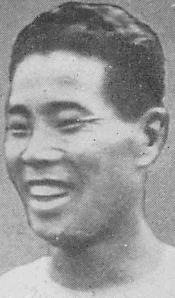Kanaguri Shisō
Kanaguri Shisō ( Japanese 金 栗 四 三 ; also Kanakuri Shizō ; * August 20, 1891 in Harutomi (today: Nagomi ), Kumamoto Prefecture ; † November 13, 1983 ) was a Japanese marathon runner and, together with the sprinter Mishima Yahiko, the first Japanese athlete who participated in the Olympics . He became known through a curious incident at the 1912 Olympic Games in Stockholm .
Kanaguri grew up in southern Japan. He studied in Tokyo , where Kanō Jigorō discovered his talent for running.
He qualified as one of two athletes to represent Japan at the Olympics for the first time. His fellow students collected money so that he could start the long journey. To reach Stockholm, he had to travel for 18 days, first by ship to Vladivostok , then with the Trans-Siberian Railway by train across Russia and Finland to Sweden . Completely exhausted, it took him five days to resume training.
The marathon took place on the last day of the Olympic Games. The unusual heat of 30 ° C bothered all athletes - the Portuguese Francisco Lázaro even collapsed and died the following day. Kanaguri was no exception. As he was walking through the Stockholm suburb of Sollentuna at kilometer 26.7 , he briefly lost consciousness and was provided with drinks and the opportunity to rest by a family who was sitting in their garden. After quenching his thirst and lying down, he fell asleep instantly and did not wake up until the next morning when the police had already been called in to find the missing runner.
Allegedly, Kanaguri was so ashamed that he initially refused to go back to Japan. In the next three years, Kanaguri won the national championships in the marathon. At the Olympic Summer Games in 1920 he finished 16th, at the Olympic Games in 1924 he had to give up after setting an Asian record with 2:36:10 h in the same year.
In 1957 he was awarded the Asahi Prize . In April 1967, 75 years old and a university professor, he traveled back to Stockholm, continued his run from the point at which he had taken the break, and finished 54 years, 8 months, 6 days, 3 hours, 32 minutes and the slowest marathon of all time 20.3 seconds after the start.
Web links
- Kanaguri Shisō in the Sports-Reference database (English; archived from the original )
Individual evidence
- ↑ Archived copy ( Memento of the original from May 5, 2015 in the Internet Archive ) Info: The archive link was inserted automatically and has not yet been checked. Please check the original and archive link according to the instructions and then remove this notice.
- ↑ a b SPIEGEL ONLINE, Hamburg Germany: Slowest marathon of all time: Average speed 0.000084 km / h - SPIEGEL ONLINE - one day. Retrieved July 14, 2017 .
- ↑ Brockhaus Calendar 2001, quoted in Archivlink ( Memento of the original from September 30, 2007 in the Internet Archive ) Info: The archive link was inserted automatically and not yet checked. Please check the original and archive link according to the instructions and then remove this notice. , P. 14
- ↑ http://www.arrs.run/NC_MaraJPN.htm
- ↑ Archived copy ( Memento of the original dated December 31, 2006 in the Internet Archive ) Info: The archive link was inserted automatically and has not yet been checked. Please check the original and archive link according to the instructions and then remove this notice. , P. 30
| personal data | |
|---|---|
| SURNAME | Kanaguri, Shisō |
| ALTERNATIVE NAMES | 金 栗 四 三 (Japanese); Kanakuri Shizo |
| BRIEF DESCRIPTION | Japanese marathon runner |
| DATE OF BIRTH | August 20, 1891 |
| PLACE OF BIRTH | Harutomi , Kumamoto Prefecture |
| DATE OF DEATH | November 13, 1983 |
